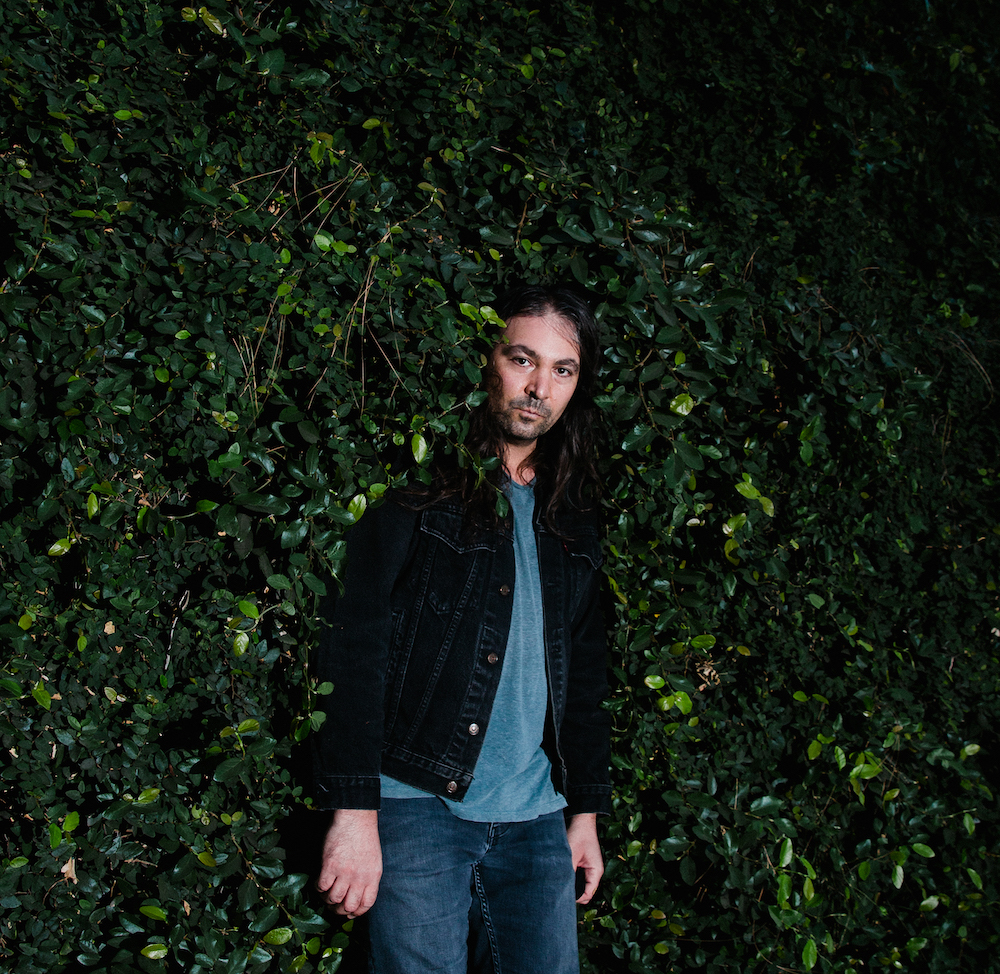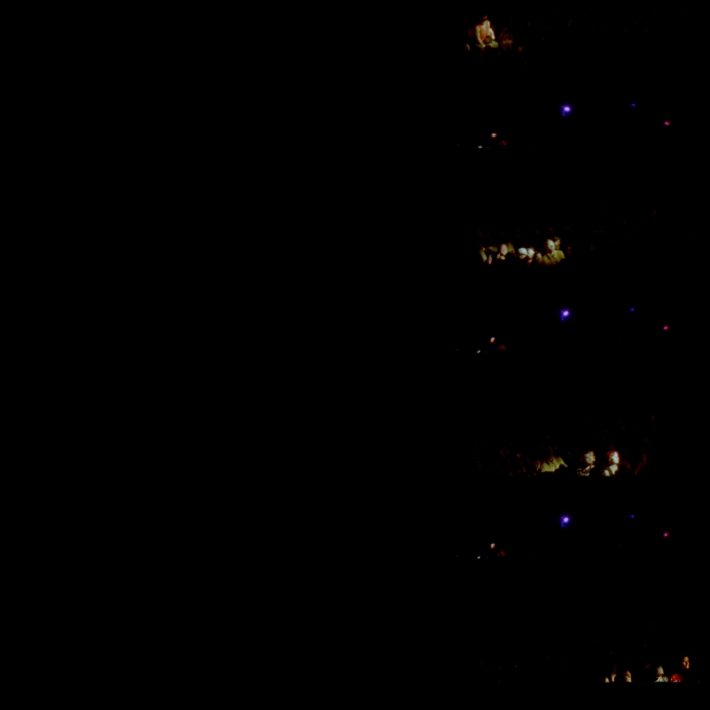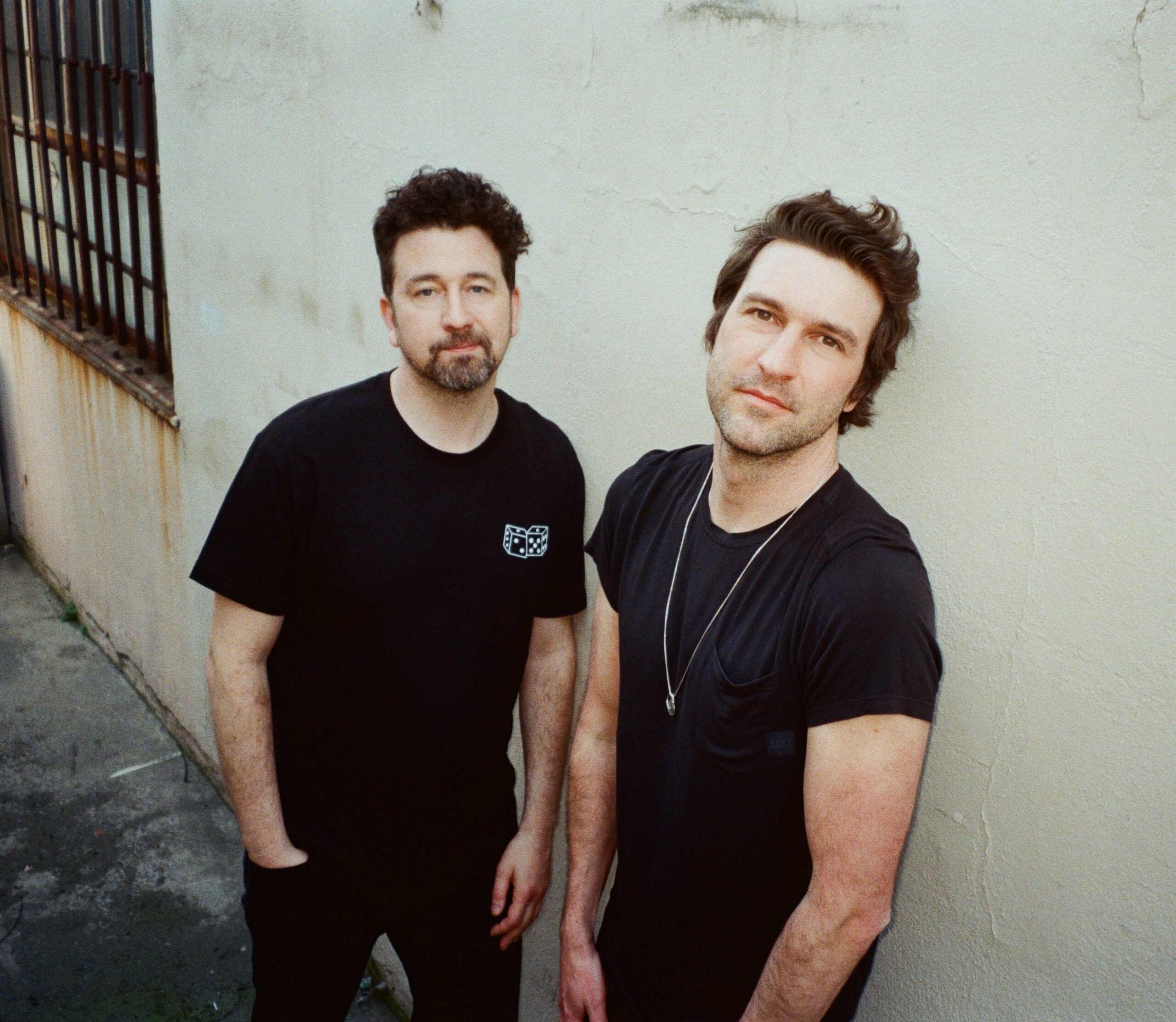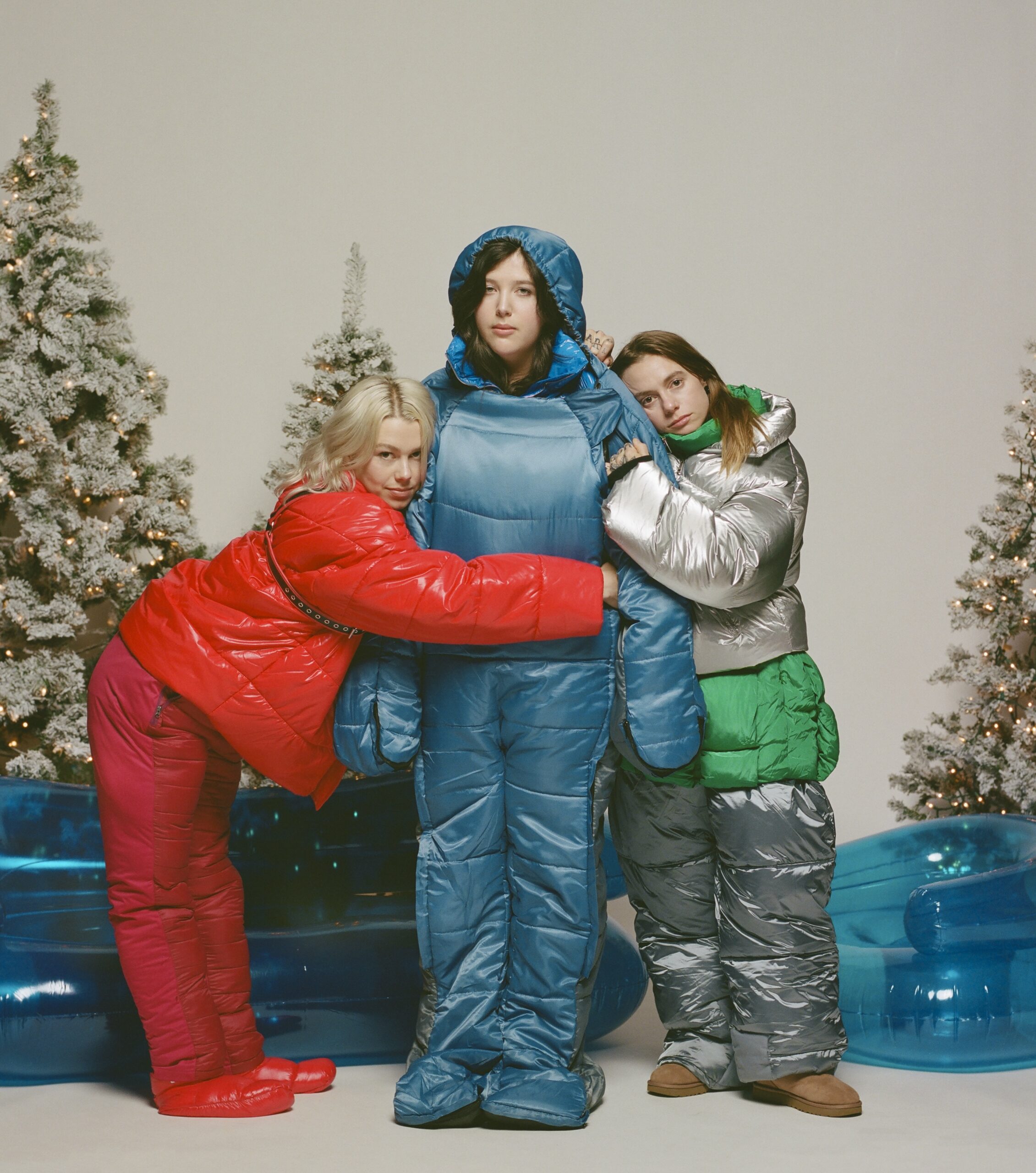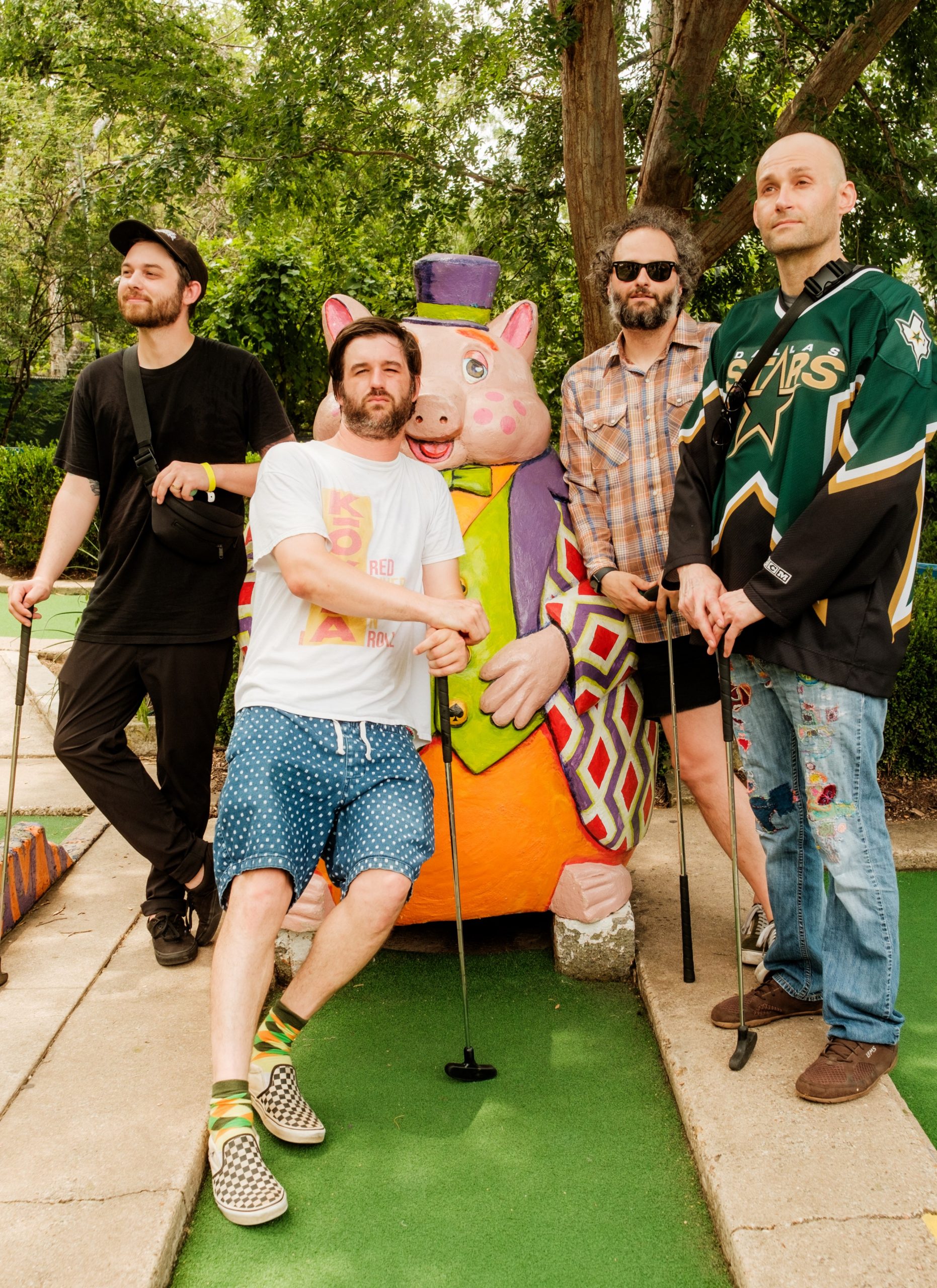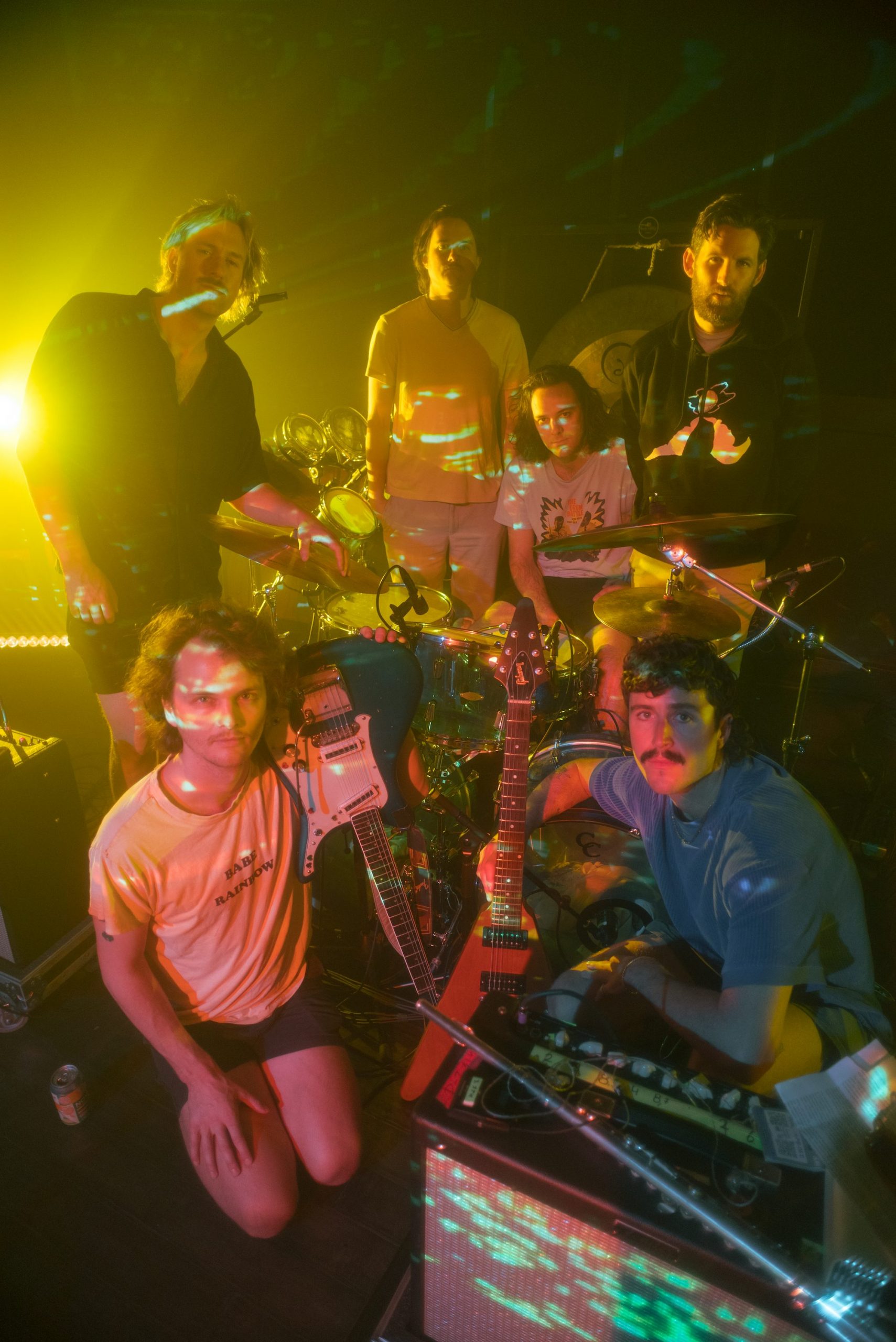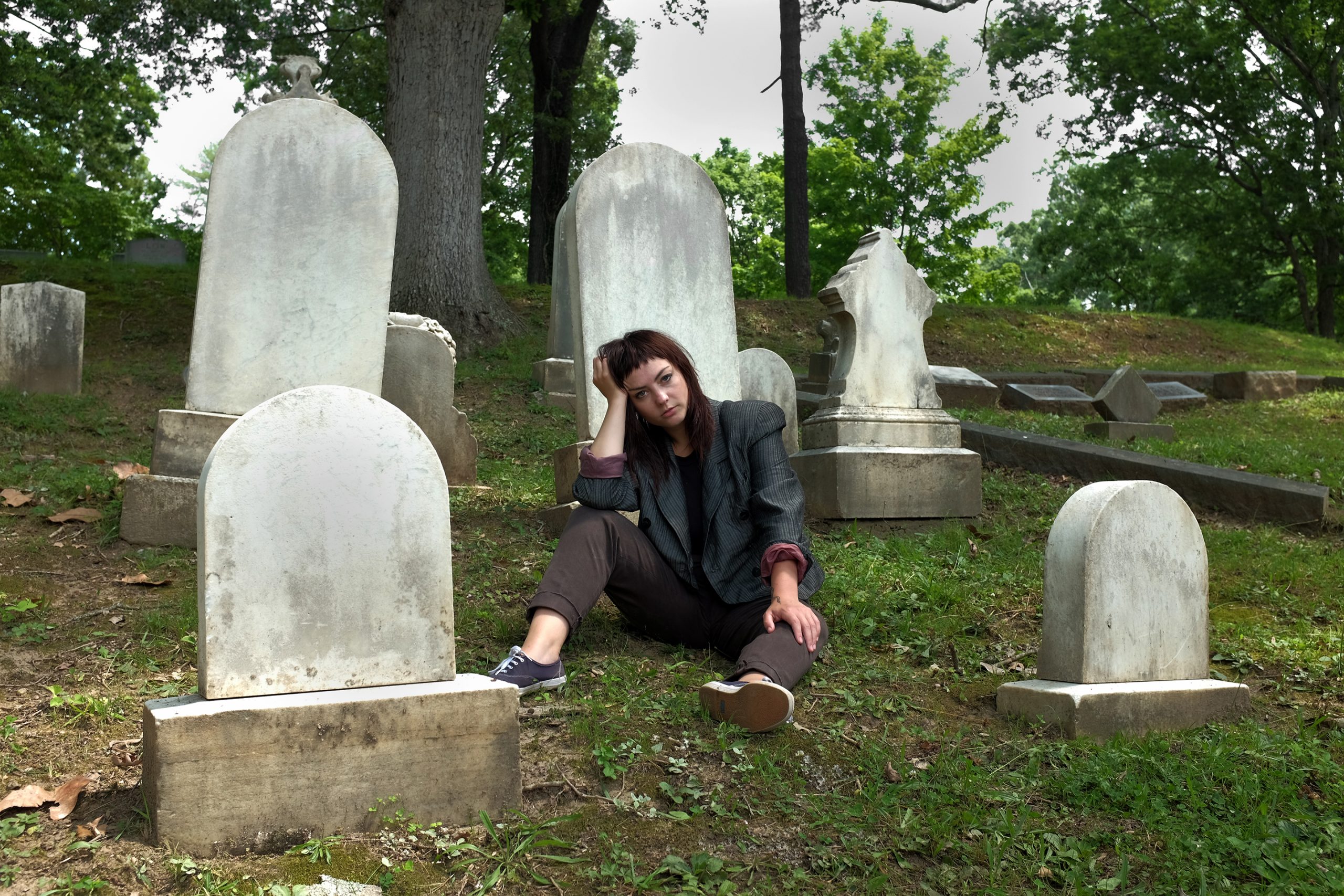The War On Drugs are about to release a live summary of the last six years, but they're also close to their next big studio statement. Adam Granduciel talks about how his band has transformed and where they're going next.
The last time I spoke to Adam Granduciel, things were totally different. We spent days walking icy roads around Philadelphia, touring the streets that had given birth to his band, The War On Drugs. We spent time driving in a beat-up tour van, and in unheated basement rehearsal spaces, and at local haunts across Fishtown. It was one of the first times I'd profiled a musician, and unbeknownst to either of us, The War On Drugs were about to go from a beloved, cultish concern to one of the ascendant rock bands of the decade. We were both almost seven years younger, and perhaps each of us was a little less certain about our respective places in the world.
Now, on the other side of everything, the circumstances of our conversation today couldn’t have been recognizable then. We’re talking over Zoom, as has become 2020 custom. I'm in Nashville, where I’m passing through during COVID-era displacement. Granduciel, 41, is in LA, where he has long since settled with his partner and, now, his baby. On this October afternoon, he's calling from a studio in Van Nuys, where he's just settling into another multi-week stint working on the Drugs' forthcoming fifth album. There's a lot to say about with what's to come, but much has also happened in the lead-up to this moment.
The War On Drugs are in a radically different place than they were back then, in the early weeks of 2014 before Lost In the Dream arrived. The album was both a surprising and an implausible breakthrough for a band that was as much classicist in disposition as they were manipulators of that past they were drawing upon. They steadily climbed the ranks of festival lineups, signed to a major label. And then A Deeper Understanding happened in 2017, and the band reached a once unimaginable echelon. They won a Grammy; they became one of the big rock acts of their generation by exhuming previously passé influences. Granduciel once told me, prior to all those milestones, that he hadn't felt as if he was contributing to the canon as he wished. Now, he was part of the canon, but also a man playing around within it, warping and recontextualizing the deep classic rock foundations.
The occasion for our discussion now, after all those changes, is not quite the next chapter of The War On Drugs, but a transition, a summary. Next week, they will release LIVE DRUGS, a straightforwardly titled live album intended to chronicle the growth undertaken by the band between the Lost In The Dream and the A Deeper Understanding tour cycles, a time when they became a band in a truer sense than ever before. Their lineup cohered: Granduciel at the helm, longtime members Dave Hartley on bass and Robbie Bennett on keys/synths, rounded out by Charlie Hall on drums and multi-instrumentalists Jon Natchez and Anthony LaMarca. A whole new iteration of The War On Drugs' music developed onstage separate from the intricate, articulate studio layers of Granduciel’s work otherwise.
In some ways, the live album almost comes across like an act of therapy. The idea and recordings span years, but Granduciel returned to it during quarantine. "I had just come off working on this new record, and there’s so much self-doubt and things up in the air," he says. "'Is the song good enough?' Then you hear a live thing and there isn’t any of that." In a sense, the live sprawl the Drugs have adopted could be something to ground themselves in, a reminder of what they are capable of while they search for the next thing.
Of course, releasing a live album in 2020 is something of a novel, out-of-time endeavor. Once upon a time, a fan likely would not have been able to readily access such documents. Now, everything is online; every given show is preserved in the digital amber of YouTube and Instagram. The constant availability of live footage was almost more of a persuasion for Granduciel than it was a dissuasion. A live album, for a band that's become a whole entrancing onstage entity separate from anything else, was an opportunity to capture part of the group’s identity in a more official way than a cellphone video. "I think I heard it and was like, we can put out something that is a really good representation of the five years that the six of us have been a band," Granduciel explains. Not an entirely anachronistic endeavor, it was a chance to tell this part of the Drugs story the way they wanted.
While LIVE DRUGS was curated from a gigantic trove of material -- shows recorded around the world, across half a decade -- it was structured with a specific arc in mind. Granduciel looked back to inspirations like the legendary Bruce Springsteen box set Live 1975-85, with the idea that it could plausibly be one show. To that end, LIVE DRUGS represents the general vibe of Lost In The Dream and A Deeper Understanding shows, mostly eschewing the past of Wagonwheel Blues and Slave Ambient to incorporate the evolved versions of songs like "Eyes To The Wind" and recurring Drugs standards like their cover of Warren Zevon's "Accidentally Like A Martyr." As ever, Granduciel dug himself into the guts and specifics of the whole thing, referencing the snare drum sound on that Springsteen comp, achieved by Bob Clearmountain with perhaps a bit of trickery. "If our sound guy got a snare drum to sound like that every night?" he says dryly but excitedly, "He’d get his own plane, he’d get his own hotel room, whatever he wants."

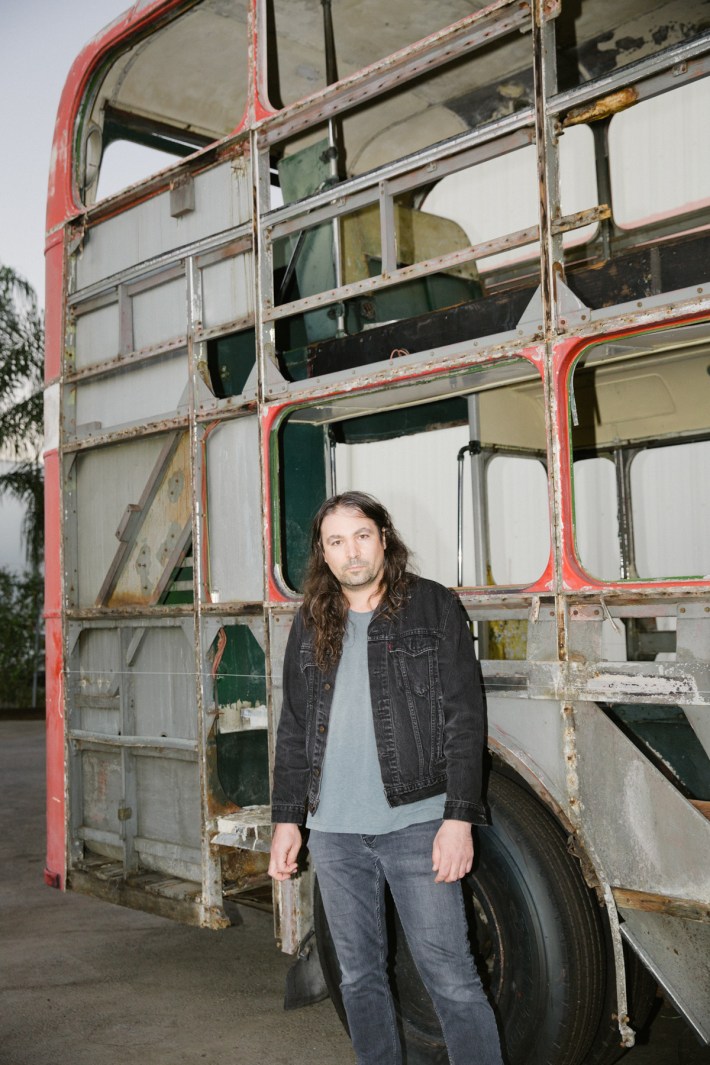


So much of The War On Drugs' music works off a tension: The directness of traditional singer-songwriter forms agains the psychedelic smear of studio excursions deep into the mind. That’s a formal quality of LIVE DRUGS, but also an aspect of Granduciel's personal experience with the material. "These shows are a blur," he explains. "A memory I had from a show I culled from maybe wasn’t the same as I remember it. When we look out at the audience it's hazy, and you wake up and look at photos and you're like, did this happen?"
In the process of making LIVE DRUGS, they spliced together the best of various performances to try and solidify an interaction of those scattered, impressionistic scenes. For listeners, it might echo a live show experience currently lost to the past. For Granduciel, it might be a mechanical way to cobble together loose ends of personal history the same way his music has often done for musical history. "I wanted to go through the wormhole a little bit," he explains. "Taking six versions of 'Under The Pressure' and getting it down to one." Earlier this week, the Drugs also announced a podcast would accompany the live album, with the band digging into the stories of how these live interpretations came to be over time.
Beyond the out-of-time nature of piecing together an album from years of performances, there's a disorienting quality to LIVE DRUGS arriving when it does, at the tail end of a year in which concert experiences were stolen from us. While that was once a major aspect of Granduciel's life, his existence under quarantine didn’t necessarily change drastically from how he was living in LA before the pandemic. Back then, it was still waking up, tweaking new music in the studio when time allowed, and raising his infant son, who proved a burgeoning musician himself when he'd crawl into Granduciel's space to toy with effect pedal knobs or plunk along at a Wurlitzer with his father. Well before the mandated isolation we’ve all experienced this year, Granduciel was indulging his homebody tendencies, trading a social life in LA for the beginning to the laborious journey towards the next War On Drugs album.
https://youtube.com/watch?v=Ppl4-1-a58k
Granduciel has been working on the material that will make up the fifth War On Drugs LP for years, but right now it's still hard to say when it’ll be out in the world. "In March I would've told you it was 80% done, and now looking back it was actually 40% done," he explains. Each time he and engineer Shawn Everett reconvene for a multi-week studio stint, he thinks this is it, this is the last chunk of time they'll need. When he and I speak, they're once more camped out in the studio, and again, it seems the completion of the album is just around the corner.
In most ways, Granduciel has embraced the slow-burn growth of these new songs, and in turn benefited from the long delay of quarantine; it gave him time to refine ideas, to find his way to certain songs. "Some songs have been reimagined since, which has been a blessing," he explains. "Some songs have had just one more layer of mud removed from them."
Take, for example, "Ocean Of Darkness," which the band recently debuted on Fallon. Granduciel has had a version of that song for a long time, but something wasn't quite right. Then, the sort of tumble-through-the-archives process you'd expect from the Drugs unfolded during quarantine. On a band text thread, someone put in a video of Pete Townshend playing his cover of the English Beat's "Save It For Later," and talking about how much he loves the song and its strange tuning, which was apparently inspired by the Velvet Underground. So Granduciel gave the tuning a shot, and a new version of "Ocean Of Darkness" fell into place. "The whole course of events leading up to me feeling inspired by these chords, I didn’t have that luxury six months ago," he says. Now the song has a dusty thrum to it, the sort of haggard, sneaky earworm that’s right in the band's sweet spot.
Even before quarantine, there was a longterm patience to the writing process. Where A Deeper Understanding had primarily been made through a series of in-person sessions, Granduciel built this new material up by demoing over and over, sometimes in small groups with two or three other musicians. "I kind of had a much stronger foundation of a song, and it's been fun to paint on top of it," he says. It's also given time for the songs to spread out and develop, with Granduciel now sending stuff to members spread out across the country and seeing what they come up with on their own time, without the pressure of a studio. "You give up a little control over the sound," he muses. "But I've kinda learned it doesn’t really fucking matter if you have all the best mics on the piano but Robbie's not feeling it, you know?"
The fact that Granduciel specifically references Bennett's contributions in that moment make sense: Based on the songs he premiered in an Instagram Live hang back in early lockdown, the fifth War On Drugs album sounds like it's going to have a ton of keyboards. A Deeper Understanding was a dense, lush album, but these new songs sounded more synth-forward. "One of those songs was built on tape loops I made at Electric Lady," Granduciel says. "It’s really enveloping. In a way that's kind of a more updated way of how I arrived at stuff on Slave Ambient."
"All the songs I love are the ones that came out of nowhere."
Adam Granduciel
Daniel Topete/Stereogum
One of those songs, "Harmonia's Dream" -- which is named for the '70s kosmische supergroup, contrary to being labelled "Harmonious Dream" online -- again benefitted from the demoing process. Anyone who’s heard it knows its a gorgeous, synth-drenched track. Granduciel reveals the instrumental he played on Instagram is actually only the middle of the song, the big payoff after a first section that was still too unfinished to share. That all came about way back when A Deeper Understanding was just coming out, and Granduciel and Bennett were demoing in Brooklyn. "It was the perfect sound," Granduciel recalls of Bennett arriving at that middle section. "Looking back on it now three and a half years later, I still can’t believe someone composed that in the moment without a flub or a wonky note or getting overly confident with the fact that he’d really dialed something in. I've been carrying that section around for three and a half years now, just forming the song around this middle section." Again, Granduciel attributes those moments of magic to the laidback, pared-down demoing sessions.
All three of the songs from that Instagram stream are definitely going to be on the new album. It sounds like, after the drift of Lost In The Dream and the towering aesthetic of A Deeper Understanding, the fifth album might wind up being more direct. Granduciel mentions being more "deliberate" with arrangements, and who knows what that could yield given how carefully calibrated the big releases in prior Drugs songs have been. He also mentions that all the songs are under five minutes. "But they are still arguably more esoteric, sonically, than some of the longer songs," he adds.
Once Granduciel gets going talking about the new material, he's audibly animated. He mentions another new track, "I Don’t Live Here Anymore," that he’s particularly excited about. Back when his child was a newborn, he didn’t have much time to write. But one night after putting the baby to sleep, he sat down with a guitar to try out some chords he’d had earlier in the day, and a bunch of verses for "I Don’t Live Here Anymore" spilled out. He uploaded it to the band Dropbox — a mechanism he obsessively (and joyously) curates into different sections — and waited to see if anyone gravitated towards it. They did, and the song’s been built up since from those original two chords; on the final version, it features guest vocals from Lucius. "It's just all my favorite music filtered through myself and our sound," Granduciel says of the song.
He brings up another called "Living Proof," the result of another NYC demo session, this time accompanied by Here We Go Magic's Mike Bloch on guitar. They had an hour left in the session and had already done a bunch of demos, and Granduciel almost wanted to leave it. Then he revisited a simple voice memo from the day before, and all the sudden "Living Proof" took shape in a couple takes. "I feel like having songs is such a fleeting thing," Granduciel ventures. "I could’ve never uploaded that to the Dropbox, or listened to the memo. I just remembered how fun it can be to stumble on a song. I think all the songs I love are the ones that came out of nowhere. All the sudden, in that moment, when you’re really creating this thing, all these things come back and make sense in the moment."
Though Granduciel is focused on just getting this album finished, it must've been an inspiring stretch of time: He’s also already talking about the music that’s not going to be on the album. It seems there’s going to be a lot of leftover material to parse. "I think I’d like to do another record," Granduciel says, projecting out across 2021 and the ongoing inability to tour. "I thought maybe I’d make… not a solo album, but something different." There’s a bunch of songs that aren't quite done, or aren’t quite right for this album.
One of those is a 34-minute song that came out of a studio jam with Hartley, LaMarca, and a LinnDrum. "I tried editing it down and I got it to 26 minutes and then we got it down to 12 minutes and… you just gotta have the whole thing," Granduciel says. He mentions maybe it could be a standalone single. "Once I finish the bulk of the material I feel works together [for the album], it'd be cool to find some time to put some of this stuff together," he adds. "It feel like its own thing."
Obviously, a lot looms over this next album — perhaps even more than loomed over A Deeper Understanding as the successor to Lost In The Dream. This time around, the Drugs are a big deal. This time, they either need to somehow further broaden a sound seemingly perfected on A Deeper Understanding, or begin to push into new territory. Granduciel feels some of that pressure — the same doubt that always haunts the album process for him. But perhaps along the way, with a long quarantine chance to sift through the material and to revisit the recordings for LIVE DRUGS, he was able to ground himself. After all, his life and stature have been altered in these past several years, and it doesn't seem to faze him.
Granduciel has always been a matter-of-fact musician in conversation: Even given how different his life is now, he doesn’t necessarily find himself writing from the perspective of a rock star. The act of making the music is inspiration enough, and then perhaps the same aging process we all experience. "When you're younger you get inspiration in the dirty alleys and the two AM hangouts, and now I’m a little older and I’m getting inspiration from getting a little older," he says. "You see that meme of the Traveling Wilburys and Tom Petty is like 39 and you're like, ‘What the fuck!?’ I thought they were 70 when I was a kid. I’m almost fucking Jeff Lynne now. Unbelievable."
"I’m still trying to figure out, like anybody, what makes a full life," Granduciel reflects. The searching hasn't totally gone away amidst the whirlwind The War On Drugs have experienced in the last six or seven years. Maybe the searching never quite goes away, but it seems he's gotten just a bit closer. The last time I spoke to Granduciel, things were totally different. He wasn’t even sure if he’d really continue to be a musician full time. Years later, more and more people have found something for themselves in the expansive, immersive sound of The War On Drugs. Granduciel's built whole worlds, and it appears that sooner than later we'll get to hear what the next one is like, to see what can happen for The War On Drugs from here. In the meantime, Granduciel's just plugging along with the work, as he always does. "Music is my profession," he says towards the end of our conversation. "But I still get a great joy out of pushing myself, out of getting something greater than the last thing we made."
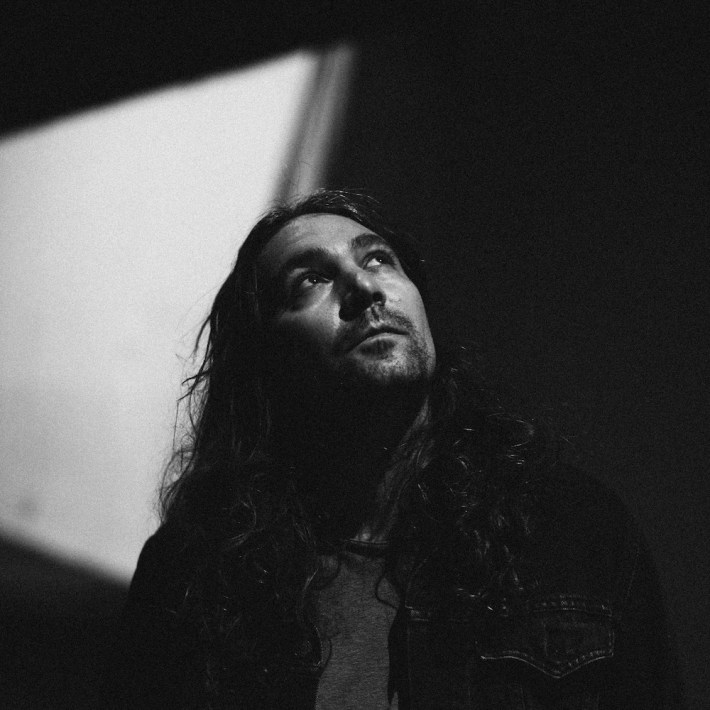
LIVE DRUGS is out 11/20 via Super High Quality Records. Pre-order it here.
